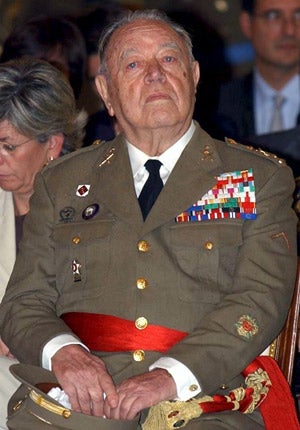José Luis Aramburu Topete: General who stood up to the 1981 attempted coup against the Spanish government

Your support helps us to tell the story
From reproductive rights to climate change to Big Tech, The Independent is on the ground when the story is developing. Whether it's investigating the financials of Elon Musk's pro-Trump PAC or producing our latest documentary, 'The A Word', which shines a light on the American women fighting for reproductive rights, we know how important it is to parse out the facts from the messaging.
At such a critical moment in US history, we need reporters on the ground. Your donation allows us to keep sending journalists to speak to both sides of the story.
The Independent is trusted by Americans across the entire political spectrum. And unlike many other quality news outlets, we choose not to lock Americans out of our reporting and analysis with paywalls. We believe quality journalism should be available to everyone, paid for by those who can afford it.
Your support makes all the difference.The death of General José Luis Aramburu Topete was an event which would barely have caused a ripple in Spanish society but for what happened one night in his life – arguably the most critical in the history of his country's democracy.
On 23 February 1981, as director of the country's Civil Guard – its militarised police force – Aramburu Topete played a key role in thwarting western Europe's last full-blown attempted coup d'état, co-led by one of his own men, Lt. Col Antonio Tejero.
When Tejero and 200 Civil Guards burst into the packed chamber of the lower house of Parliament and held up the deputies at gunpoint at around 6.30pm, Aramburu Topete first led other units loyal to Spain's six-year-old democracy to surround the Palace of Congress, then went to negotiate with Tejero in person just inside the building.
"He came to meet me with three other Civil Guards with their guns drawn," Aramburu Topete recalled during Tejero's trial. "First he saluted me, but then when I told him, as his superior, to surrender, he said he would have to kill me first and then himself. At that point he was pointing his gun at me."
The stand-off nearly ended fatally as Aramburu Topete attempted to draw his pistol and his opponents cocked their weapons, but after being persuaded by his own men that a shoot-out was not the solution, the general went back to his temporary headquarters in the Hotel Palace 100 yards away from the Congress buildings and spent the rest of the night helping lead military resistance to the coup.
Standing up to a right-wing fanatic like Tejero at huge personal risk showed more loyalty than a considerable number of Spain's generals, many of whom stayed in their barracks and waited to see what transpired. Just as importantly, his bravery proved to Spanish society and the government that just because one man in a green uniform and a winged helmet was standing on the speaker's podium inside Parliament firing bullets into the ceiling and screaming at their elected MPs to lie on the floor, not everybody in the Civil Guard was determined to return Spain to the kind of military dictatorship it had suffered for 40 years.
The coup d'état failed thanks to a combination of factors, including the conspirators' failure to seize key media outlets in Madrid and the king's televised refusal to support them, as well as Aramburu Topete's crucial behind-the-scenes work alongside the chief of the national police force, Jose Antonio Saenz de Santamaria. Then, when the military superior Tejero was expecting failed to turn up with reinforcements (his identity has never been revealed), it was clear the game was up even to Tejero, and a surrender – known as the "Bonnet Pact", as it was signed on the bonnet of a police Land Rover – was signed, with Aramburu as witness.
Aramburu Topete spent most of his career as a professional soldier. Born in the frontier province of Huelva, he studied mining before joining Franco's army during the Civil War, taking part in the battles of Brunete and Teruel.
As captain of a sappers' battalion he formed part of the Division Azul, Spain's volunteer military units that fought alongside the Germans on the Eastern Front during the Second World War, before being promoted to Colonel and serving in the Spanish Sahara up until the Division's return to Morocco, just before Franco's death in 1975.
Named director of the Civil Guard in 1980 – at the time it was always headed by a professional soldier – one of Aramburu Topete's tasks was to quell internal resistance to the Parliament's decision that year to make the Civil Guard partly responsible to the Ministry of Interior. Ensuring a militarised police force like the Civil Guard no longer automatically saw the army as their rightful superiors was an important achievement for a fledgling democracy.
However, Aramburu Topete will be mostly remembered as the Spanish general who went out to tackle Tejero's attempted coup d'état head-on – and won.
José Luis Aramburu Topete, soldier: born Huelva, Spain 23 July 1918 ; died Madrid 13 January 2011.
Join our commenting forum
Join thought-provoking conversations, follow other Independent readers and see their replies
Comments